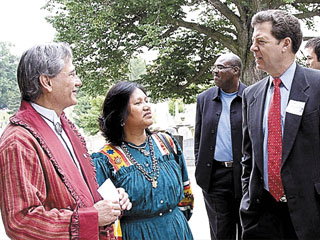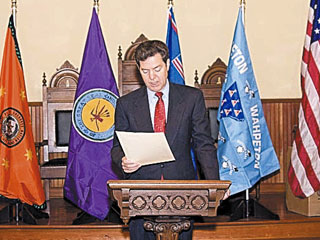Native apology said out loud
Obama still silent
By Rob Capriccioso
During a May 19 ceremony at the Congressional Cemetery chapel, Sen. Sam Brownback, R-Kan., read the Native American Apology Resolution to tribal representatives of five tribal nations. Brownback was the main sponsor of the Senate version of the resolution, which passed Congress last fall. He had been pushing for the measure since 2004.
Rep. Jim McDermott, D-Wash., author of the legislation in the House, was also on hand.
“There is a rich history here, and there is a past wrong,” Brownback said at the event, addressing tribal leaders. “The U.S. government saw Native Americans not as people, but as a problem. This apology is an effort to start a reconciliation process to rebuild relations and it starts now.”
 |
| Cherokee Chief Chad Smith (left) spoke with Sen. Sam Brownback, R-Kan., who read the Native American Apology Resolution during a ceremony at the Congressional Cemetery. |
Obama signed the resolution into
law in December as part of another piece of legislation to no
fanfare, perplexing many Native Americans regarding his sincerity,
since the White House did not issue any announcements.
The president to date has not expressed intentions to say the
apology out loud, as has been done for other disenfranchised groups
on other contentious issues in U.S. history.
Brownback touched on the Obama issue in a January interview with
Indian Country Today, saying he thought the president should hold an
event with many tribal officials in attendance. He reiterated his
desire in April, saying he’s been “pushing the administration to
have a major public ceremony, but they aren’t taking it on yet.”
When asked again May 26 if Obama will make an out-loud apology, Shin
Inouye, a spokesman for the White House, said he had “no updates on
this issue.” The White House has been asked since January if Obama
would consider such a move.
“For an apology to have any meaning at all, you do have to tell the
people you’re apologizing to,” Robert T. Coulter, executive director
of the Indian Law Resource Center, has said regarding the silence.
The resolution, as signed by Obama, provided no financial
reparations for past wrongs. In written words, it apologized “on
behalf of the people of the United States to all Native peoples for
the many instances of violence, maltreatment, and neglect inflicted
on Native peoples by citizens of the United States.”
Besides Brownback and McDermott, two other Congress members were in
attendance at the Congressional Cemetery ceremony, Lois Capps, D-Calif.,
and Mazie Hirono, D-Hawaii.
Ed Shelleby, a spokesman for McDermott, said his office has “only
heard positive responses” regarding the apology.
The event was organized by the Faith and Politics Institute as part
of a larger ceremony honoring the 36 Indians who are buried in the
Congressional Cemetery. The organization often works in a bipartisan
manner with members of Congress on faith and spirituality matters.
“We wanted to do something via a congressional ceremony to honor
Native heroes,” said Robin Fillmore, a program director with the
organization.
Fillmore explained the institute worked with Cherokee Chief Chad
Smith to help plan the event, though it was Brownback’s idea to
attend and read the apology. Brownback has worked with the institute
in the past.
The institute had long been wanting to work with tribal nations, but
this was the first time it had done so, Fillmore said.
Fillmore said it was difficult to reach tribal nation officials to
participate in the ceremony. Thirteen tribes have individuals buried
in the cemetery; five nations had representatives at the ceremony.
There are 564 federally-recognized tribes nationwide.
The National Congress
of American Indians served as a co-sponsor of the event.
NCAI Deputy Director Robert Holden said at the ceremony that
“dignity is taking a long step in being restored” through the
federal apology.
“And from this day we all will do many important things together. It
starts here with this (apology), this long process. This is a
historic event in the history of this nation.”
© 1998 - 2010 Indian Country Today. All Rights Reserved To subscribe or visit go to: http://www.indiancountry.com
